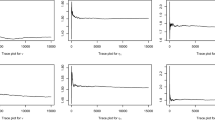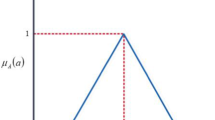Abstract
For solution of reliability-based design optimization (RBDO) problems, single loop approach (SLA) shows high efficiency. Thus SLA is extensively used in RBDO. However, the iteration solution procedure by SLA is often oscillatory and non-convergent for RBDO with nonlinear performance function. This prevents the application of SLA to engineering design problems. In this paper, the chaotic single loop approach (CLSA) is proposed to achieve the convergence control of original iterative algorithm in SLA. The modification involves automated selection of the chaos control factor by solving a novel one-dimensional optimization model. Additionally, a new oscillation-checking method is constructed to detect the oscillation of iterative process of design variables. The computational capability of CLSA is demonstrated through five benchmark examples and one stiffened shell application. The comparison of numerical results indicates that CSLA is more efficient than the double loop approach and the decoupled approach. CSLA also solves the RBDO problems with highly nonlinear performance function and non-normal random variables stably.







Similar content being viewed by others
Abbreviations
- RBDO:
-
Reliability-based design optimization
- FORM:
-
First order reliability method
- RIA:
-
Reliability index approach
- PMA:
-
Performance measure approach
- AMV:
-
Advanced mean value
- HMV:
-
Hybrid mean value method
- CGA:
-
Conjugate gradient analysis
- CC:
-
Chaos control
- MCC:
-
Modified chaos control method
- SORA:
-
Sequential optimization and reliability assessment
- SLSV:
-
Single loop single vector
- SLA:
-
Single loop approach
- RDS:
-
Reliable design space
- CSLA:
-
Chaotic single loop approach
- U-space:
-
Standard normal space
- MPTP:
-
Most probable target point
- C :
-
Objective function
- g :
-
Performance function
- d :
-
Design variables
- d L :
-
Low bounds of design variables
- d U :
-
Upper bounds of design variables
- x :
-
Random design variables
- μ x :
-
Mean of random design variables
- \( {\boldsymbol{\upmu}}_{\mathbf{x}}^L \) :
-
Low bounds of random variables
- \( {\boldsymbol{\upmu}}_{\mathbf{x}}^U \) :
-
Upper bounds of random variables
- σ x :
-
Standard deviation variables
- p :
-
Random variables
- μ p :
-
Mean of random variables
- σ p :
-
Standard deviations of random variables
- P t :
-
Admissible failure probability
- β t :
-
Target reliability index
- P f :
-
Failure probability
- f x , p (x, p):
-
joint probability density function
- u :
-
Normalized random variable
- λ :
-
Chaos control factor
- C :
-
Involutory matrix
- f :
-
Response function vector
- k :
-
Iterative step number
- g :
-
Performance function
- G :
-
Performance function in U-space
- ∇ x g :
-
Sensitivities of performance function with respect to random design variables x
- ∇ p g :
-
Sensitivities of performance function with respect to random variables p
References
Aoues Y, Chateauneuf A (2010) Benchmark study of numerical methods for reliability-based design optimization. Struct Multidiscip Optim 41:277–294
Chen X, Hasselman TK, Neill DJ (1997) Reliability based structural design optimization for practical applications. Paper presented at the Proceedings of the 38th AIAA/ASME/ASCE/AHS/ASC structures, structural dynamics, and materials conference, Kissimmee, Florida, 7–10 April
Chen ZZ, Qiu HB, Gao L, Li PG (2013a) An optimal shifting vector approach for efficient probabilistic design. Struct Multidiscip Optim 47:905–920
Chen ZZ, Qiu HB, Gao L, Su L, Li PG (2013b) An adaptive decoupling approach for reliability-based design optimization. Comput Struct 117:58–66
Cheng GD, Xu L, Jiang L (2006) A sequential approximate programming strategy for reliability-based structural optimization. Comput Struct 84:1353–1367
Cho TM, Lee BC (2011) Reliability-based design optimization using convex linearization and sequential optimization and reliability assessment method. Struct Saf 33:42–50
Du XP, Chen W (2004) Sequential optimization and reliability assessment method for efficient probabilistic design. ASME J Mech Des 126:225–233
Du XP, Sudjianto A, Chen W (2004) An integrated framework for optimization under uncertainty using inverse reliability strategy. ASME J Mech Des 126:562–570
Ezzati G, Mammadov M, Kulkarni S (2015) A new reliability analysis method based on the conjugate gradient direction. Struct Multidiscip Optim 51:89–98
Kaymaz I, Marti K (2007) Reliability-based design optimization for elastoplastic mechanical structures. Comput Struct 85:615–625
Keshtegar B (2016) Chaotic conjugate stability transformation method for structural reliability analysis. Comput Methods Appl Mech Eng 310:866–885
Keshtegar B, Lee I (2016) Relaxed performance measure approach for reliability-based design optimization. Struct Multidiscip Optim 54:1439–1454
Kidane S, Li G, Helms J, Pang SS, Woldesenbet E (2003) Buckling load analysis of grid stiffened composite cylinders. Compos Part B 34:1–9
Lamberti L, Venkataraman S, Haftka RT, Johnson TF (2003) Preliminary design optimization of stiffened panels using approximate analysis models. Int J Numer Methods Eng 57:1351–1380
Lee JO, Yang YS, Ruy WS (2002) A comparative study on reliability-index and target-performance-based probabilistic structural design optimization. Comput Struct 80:257–269
Lee I, Choi KK, Du L, Gorsich D (2008) Inverse analysis method using MPP-based dimension reduction for reliability-based design optimization of nonlinear and multi-dimensional systems. Comput Methods Appl Mech Eng 198:14–27
Lee I, Choi KK, Gorsich D (2010) Sensitivity analyses of FORM-based and DRM-based performance measure approach (PMA) for reliability-based design optimization (RBDO). Int J Numer Methods Eng 82:26–46
Leriche R, Haftka RT (1993) Optimization of laminate stacking sequence for buckling load maximization by genetic algorithm. AIAA J 31:951–956
Li G, Meng Z, Hu H (2015) An adaptive hybrid approach for reliability-based design optimization. Struct Multidiscip Optim 51:1051–1065
Liang J, Mourelatos ZP, Nikolaidis E (2007) A single-loop approach for system reliability-based design optimization. ASME J Mech Des 129(12):1215–1224
Lim J, Lee B, Lee I (2014) Second-order reliability method-based inverse reliability analysis using Hessian update for accurate and efficient reliability-based design optimization. Int J Numer Methods Eng 100:773–792
Meng Z, Hao P, Li G, Wang BP, Zhang K (2015a) Non-probabilistic reliability-based design optimization of stiffened shells under buckling constraint. Thin-Walled Struct 94:325–333
Meng Z, Li G, Wang BP, Hao P (2015b) A hybrid chaos control approach of the performance measure functions for reliability-based design optimization. Comput Struct 146:32–43
Meng Z, Li G, Yang DX, Zhan LC (2017) A new directional stability transformation method of chaos control for first order reliability analysis. Struct Multidiscip Optim 55:601–612
Pingel D, Schmelcher P, Diakonos FK (2004) Stability transformation: a tool to solve nonlinear problems. Phys Rep 400:67–148
Qu X, Haftka RT (2004) Reliability-based design optimization using probabilistic sufficiency factor. Struct Multidiscip Optim 27:314–325
Reddy MV, Grandhi RV (1994) Reliability based structural optimization: a simplified safety index approach. Comput Struct 53:1407–1418
Royset J, Der Kiureghian A, Polak E (2001) Reliability-based optimal structural design by the decoupling approach. Reliab Eng Syst Saf 73:213–221
Schuëller GI, Jensen HA (2008) Computational methods in optimization considering uncertainties – an overview. Comput Methods Appl Mech Eng 198:2–13
Shan S, Wang GG (2008) Reliable design space and complete single-loop reliability-based design optimization. Reliab Eng Syst Saf 93:1218–1230
Torii AJ, Lopez RH, Miguel LF (2016) A general RBDO decoupling approach for different reliability analysis methods. Struct Multidiscip Optim 54:317–332
Tu J, Choi KK, Park YH (1999) A new study on reliability-based design optimization. ASME J Mech Des 121:557–564
Valdebenito M, Schuëller G (2010) A survey on approaches for reliability-based optimization. Struct Multidiscip Optim 42:645–663
Venkataraman S, Lamberti L, Haftka RT, Johnson TF (2003) Challenges in comparing numerical solutions for optimum weights of stiffened shells. J Spacecr Rocket 40:183–192
Yang DX (2010) Chaos control for numerical instability of first order reliability method. Commun Nonlinear Sci Numer Simul 15:3131–3141
Youn BD, Choi KK, Park YH (2003) Hybrid analysis method for reliability-based design optimization. ASME J Mech Des 125:221–232
Zou T, Mahadevan S (2006) A direct decoupling approach for efficient reliability-based design optimization. Struct Multidiscip Optim 31:190–200
Acknowledgements
The supports of the National Natural Science Foundation of China (Grant Nos. 11602076 and 51605127), the Natural Science Foundation of Anhui Province (No. 1708085QA06) and the Fundamental Research Funds for the Central Universities of China (No JZ2016HGBZ0751) are much appreciated. The authors also thank Dr. Yuxue Pu for his comments and discussion.
Author information
Authors and Affiliations
Corresponding author
Rights and permissions
About this article
Cite this article
Meng, Z., Yang, D., Zhou, H. et al. Convergence control of single loop approach for reliability-based design optimization. Struct Multidisc Optim 57, 1079–1091 (2018). https://doi.org/10.1007/s00158-017-1796-z
Received:
Revised:
Accepted:
Published:
Issue Date:
DOI: https://doi.org/10.1007/s00158-017-1796-z




